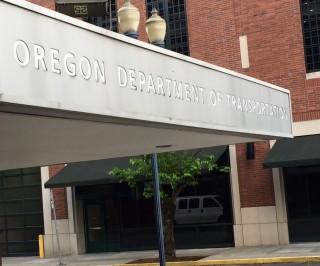The advocacy group BikeLoudPDX plans to follow Monday’s safety demonstration on Powell Boulevard by taking on what it sees as the underlying issue: city roads managed by the state’s transportation agency.
At 4 p.m. the volunteer-driven organization plans to host a “die-in” at the Oregon Department of Transportation headquarters, 123 NW Flanders St., complete with fake blood.
Here’s the group’s description of its agenda:
We believe ODOT, with its focus on auto capacity and transport between cities, is the wrong agency to control arterials within cities.
ODOT has consistently prioritized auto capacity over lives. This is why 26th Ave. does not have a left-turn signal at Powell, which would have prevented this accident. In the past, ODOT refused to put in a left-turn signal because it would slow down cars on Powell. How many limbs and lives does it take to be worth a few seconds or minutes?
The problems on Powell are not isolated to the area around 26th. Indeed, Powell is more neglected and deadly in East Portland. There are no sidewalks on Powell in the vast majority of its length past I-205. Marked crosswalks are few and far between.
This is why are calling on the state legislature to pass a bill to transfer Powell and the other urban state highways in Portland to the control of the City of Portland. We are also calling on ODOT to prioritize funding to bring Powell and the other urban state highways up to standards minimally sufficient for city life (sidewalks and crosswalks would be a good start). The City’s Bureau of Transportation, though not perfect, is at least more directly responsive to local safety concerns than ODOT.
Advertisement
“ODOT has funded about $200 million of highway ‘improvements’ in the Metro suburban region over the past few years… but meanwhile…in the urban core, people die.”
— Terry Dublinski-Milton
This isn’t a unusual position in itself; in fact, it’s one that’s been endorsed by ODOT itself in the form of a bill now in Salem that would create a process for what’s known as “jurisdictional transfer” of the state’s urban highways.
The sticking point has been that the City of Portland, like other cities, has refused to accept the roads unless ODOT either brings their sidewalks, curbs and crossings up to urban standards or hands the city a large share of the money required to do so.
Last year, Mayor Charlie Hales described the problem as being like two people at a restaurant, pushing the check back and forth at one another.
This year, the city and other agencies have proposed a one-cent-per-gallon gas tax to pay for such upgrades and make jurisdictional transfers possible. But that bill is being blocked by Republicans in the state House.
Faced with that impasse, BikeLoud volunteers Soren Impey and Terry Dublinski-Milton wrote in emails Tuesday, ODOT should be doing more than it is to make roads like Southwest Barbur, 82nd Avenue and Southeast Powell safer.
“ODOT has also been reluctant to implement inexpensive safety changes, such as, speed reduction and lane configuration during re-striping,” Impey said.
“ODOT has funded about $200 million of highway ‘improvements’ in the Metro suburban region over the past few years,” Dublinski-Milton added. “$45 million for the Helvetia interchange alone, then there is the new highway to relieve congestion in Clackamas County connecting I-205 to 122nd. This has direct ‘economic benefit to industry so it is needed,’ but meanwhile…in the urban core, people die.”
BikeLoud is asking participants to “bring a white shirt that you are willing to have stains on if you are able; we will bring fake blood!”
Correction 12:50 pm: A previous version of this story incorrectly implied that Marine Drive is an ODOT facility. It’s managed by the City of Portland. The city is applying for state funds to improve traffic safety there.


